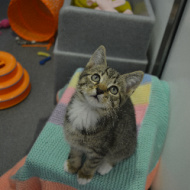
Figures for 2022 reflect lower rate of neutering.
Animal rescue and rehoming charity Battersea has shared the impact of the cost of living crisis on its centres, with a record number of puppies and kittens born in the charity's care in 2022.
With the increasing cost of living, Battersea believes that fewer households are getting their pet neutered, considering the procedure a non-essential expense.
Across Battersea's centres in London, Old Windsor and Brands Hatch, 133 kittens and 29 puppies were born in 2022, compared to a yearly average of 82 kittens and 16 puppies.
Centre manager Steve Craddock discussed the fewer numbers of pets getting neutered: “We suspect fewer people are getting their pets neutered, perceiving this to be a non-essential cost.
“However, we know the reality is quite different. Cats can reach sexual maturity and get pregnant at just four months old, leaving unneutered cats at a high risk of having unwanted kittens – which will be both time-intensive and costly to care for.
“Our research estimates the average yearly cost of owning a cat is now approximately £1,500, so any unplanned litters will come with a hefty price tag attached for the average family.”
Alongside the unprecedented number of kittens and puppies born in the charity's care in 2022, a higher proportion of pets have been admitted as a direct result of financial pressures on owners.
In November 2022, 15 per cent of dogs and 10 per cent of cats were brought into Battersea by owners who stated they could no longer afford to keep their pets.
Images (C) Battersea



 BSAVA is to partner with BVA Live (11-12 June 2026) to champion clinical research.
BSAVA is to partner with BVA Live (11-12 June 2026) to champion clinical research.